Legal troubles mount for Andy Sanborn, state spends at least $75,000 in attorney fees

Laurie and Andy Sanborn own The Draft Sports Bar and Grill and Concord Casino located on South Main Street in Concord, New Hampshire. GEOFF FORESTER
| Published: 10-28-2024 5:24 PM |
State lawyers have racked up over $75,000 in legal fees and counting on cases involving Concord Casino owner Andy Sanborn, following a joint investigation by the New Hampshire Attorney General and Lottery Commission last year that accused him of fraudulently obtaining and using pandemic loans.
A total of 13 attorneys have collectively dedicated at least 1,774 hours to cases linked to Sanborn and his companies that operate the Concord Casino and the Draft sports bar on South Main Street in Concord, according to records from the Attorney General's Office.
Those legal costs will continue to go up Sanborn is scheduled to be back in court on Tuesday, although Sanborn himself skips most of his hearings. These expenses don’t include the costs for investigative teams or resources allocated for executing search warrants.
Sanborn was arrested earlier this month on new accusations that he fraudulently secured state COVID-19 relief funds and used the money for personal expenses like paying off a mortgage of a Laconia lake house. In addition to that case, Sanborn and his legal team are battling multiple lawsuits all at once, including one he filed against the New Hampshire Attorney General over a criminal search warrant.
On May 23, a search warrant was executed, resulting in the seizure of five computers and 30 boxes of documents, according to court documents that have been unsealed. Sanborn accused the Attorney General of overreach claiming that privileged information was improperly seized and accessed by the investigative team.
Sanborn’s attorneys argued they “underestimated the seriousness and scope of the AG’s unlawful intrusions,” and are pushing for the disqualification of the investigative team from the criminal case. They further assert that the 1.7 million electronic files taken include highly sensitive materials, such as attorney-client communications, private medical records and confidential work products, according to recently unsealed court documents.
The lawsuit was initially filed under seal because Sanborn’s legal team wanted confidentiality to avoid any public perception of wrongdoing. News of the search warrant could negatively affect the sale of Concord Casino, they argued.
It is far from the only lawsuit Sanborn is facing or the only criminal investigation. Sanborn is fighting with the state Lottery Commission over his gaming license and the sale of his casino and also defending a challenge to his approval to build a new gambling establishment in East Concord.
Article continues after...
Yesterday's Most Read Articles
 Hopkinton structure fire spreads to surrounding brush and fields
Hopkinton structure fire spreads to surrounding brush and fields
 ACLU asks New Hampshire federal judge to reinstate student status for more than 100 international students
ACLU asks New Hampshire federal judge to reinstate student status for more than 100 international students
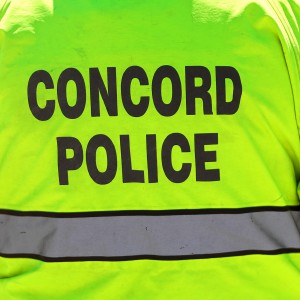 Concord man arrested after middle schooler drug exposure
Concord man arrested after middle schooler drug exposure
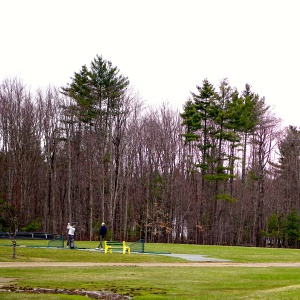 ‘Frivolous and lacking merit’: Complaint against golf committee members over clubhouse vote dismissed
‘Frivolous and lacking merit’: Complaint against golf committee members over clubhouse vote dismissed
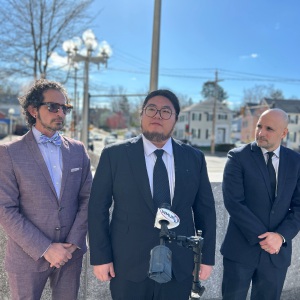 ‘A bit Kafkaesque’: Federal judge spars with government lawyer over status of Dartmouth international student
‘A bit Kafkaesque’: Federal judge spars with government lawyer over status of Dartmouth international student
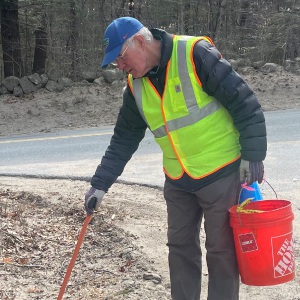 Granite Geek: A contrary Earth Day thought – we shouldn’t pick up litter
Granite Geek: A contrary Earth Day thought – we shouldn’t pick up litter
Attorney Zach Hafer accused state prosecutors of going after Sanborn to scare off any potential buyers of the casino, which is owned by Sanborn’s company, Win Win Win..
“There is thus only one reason to charge Win Win Win: to attempt to block a sale of Win Win Win that would benefit taxpayers, charities, and the local community,” Hafer wrote in an email statement. “This is a deeply concerning development and we look forward to holding the AG accountable in court.”
Documents related to Sanborn’s arrest reveal that another search warrant was executed on February 27 at Penchansky & Co. PLLC, the accounting firm in Manchester that Sanborn and his wife, State Representative Laurie Sanborn, have relied on since 2007.
The Sanborns were accused of inflating their revenue figures at both Concord Casino and the Draft sports bar and grille — his flagship establishment — to secure $286,682 from the Main Street Relief Fund, a program designed to assist small businesses during the pandemic. Had Sanborn accurately reported his revenue, he would have only qualified for $98,208, prosecutors say.
Sanborn is expected to appear at the Merrimack Superior Court in November.
Sanborn’s legal team maintains he has committed no crime.
In response to Sanborn’s lawsuit, the state clarified in court documents, that the search warrant was never intended to encompass any privileged information.
The state’s attorneys said that a dedicated team was promptly assigned to the investigation, tasked with filtering out any privileged materials before the case team accessed the seized documents.
“The search at issue can therefore hardly be characterized as a dragnet search or as a deliberate intrusion on the attorney-client relationship,” wrote attorneys for the state.
Sanborn also urged the court to issue an order preventing the Attorney General’s Office from reviewing or continuing to examine the seized materials until a stringent filter protocol was firmly established. Since then, a protocol that both parties agreed to has been in place.
During an August hearing, Judge John Kissinger didn’t disqualify the investigation team but he voiced his concerns about the process.
“I’m pretty clear that I have some concerns about the process that was followed,” he said.
Case investigators were present on the scene during the search, overseeing the identification, labeling, sealing of boxes, inventorying and transportation of the seized materials. The process took approximately three hours and fifteen minutes.
But the attorneys for the state said in one of their court filings that there was “not sufficient time — considering what was accomplished — for investigators to have reviewed individual documents.”
Sanborn’s attorneys argue that he had been attempting to sell the casino before the Attorney General’s investigation report released in August of last year announced that Sanborn fraudulently obtained an Economic Injury Disaster Loan meant for struggling small businesses and spent portions of the $844,000 on lavish personal expenses, including buying two Porsche race cars for himself and a Ferrari for his wife, State Rep. Laurie Sanborn.
The report states that Sanborn used fraudulently obtained federal pandemic relief loans to purchase two Porsche race cars for himself and a Ferrari for his wife, State Rep. Laurie Sanborn.
He is also said to have used $163,000 of the funds to make rent payments to himself, covering 27 years of prepaid rent for the Concord Casino and the Draft Sports Bar, both of which he owns.
Throughout the case, Sanborn has maintained that the state has acted in bad faith and with prejudice, requesting that the investigation be paused, the current case team be replaced, and a new one assigned.
The state maintains that the procedures followed in the investigation sufficiently protected the Sanborns’ rights while allowing the investigation to move forward in a timely and effective manner.
“To find otherwise would substantially alter the landscape of criminal practice in New Hampshire, giving a veto power in every case in which the state seizes and examines digital evidence,” wrote attorneys for the state.
Sanborn is also entangled in another lawsuit that has progressed from the Hillsborough Superior Court to the Supreme Court. This case concerns his proposed 43,000-square-foot casino on Loudon Road in Concord.
The dispute began last year when the Concord Planning Board approved the initial phase of Sanborn’s development, located near the intersection of Loudon and Sheep Davis roads, close to Interstate 393. The project is set to feature a gaming hall, microbrewery, and restaurant.
The lower court found that local resident Kassey Cameron, who filed a lawsuit contesting the city’s approval of the casino, lacked legal standing because her proximity to the casino site did not demonstrate that she would experience a significant impact from the project. Now, Cameron is appealing to the Supreme Court in hopes of overturning the lower court’s decision.
The New Hampshire Lottery Commission intensifies Sanborn’s legal troubles by opposing his repeated requests for extensions to sell the casino. According to a December order, Sanborn was required to complete the sale by September 30 or risk having his license revoked for two years.
Judge Gregory Albert ruled that the potential benefits of a licensed casino for New Hampshire outweigh the profit Sanborn stands to make from selling his Concord Casino, granting him around 50 days to complete the sale.
The Lottery Commission has said that it considers Sanborn’s license revoked as of Oct 1 and that Judge Albert “lacks the authority to extend the suspension beyond September 30.”
The state has filed a motion asking Judge Albert to clarify the decision despite stating he has no authority to extend the deadline.
Meanwhile, Sanborn’s legal team argues that delays from the Attorney General’s Office and Lottery Commission in approving the buyer are deliberate attempts to derail the sale.
Sruthi Gopalakrishnan can be reached at sgopalakrishnan@cmonitor.com.







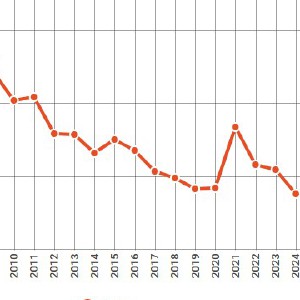 New Hampshire births fell to a modern low in 2024
New Hampshire births fell to a modern low in 2024 ‘New Hampshire is just going to embarrass itself’: Former Child Advocate warns against proposed office cuts
‘New Hampshire is just going to embarrass itself’: Former Child Advocate warns against proposed office cuts Bow recognizes two DPW workers who rescued driver of overturned propane truck
Bow recognizes two DPW workers who rescued driver of overturned propane truck ‘A large chunk of change’: Feathered Friend Brewing disputes tariff on Canadian import
‘A large chunk of change’: Feathered Friend Brewing disputes tariff on Canadian import
